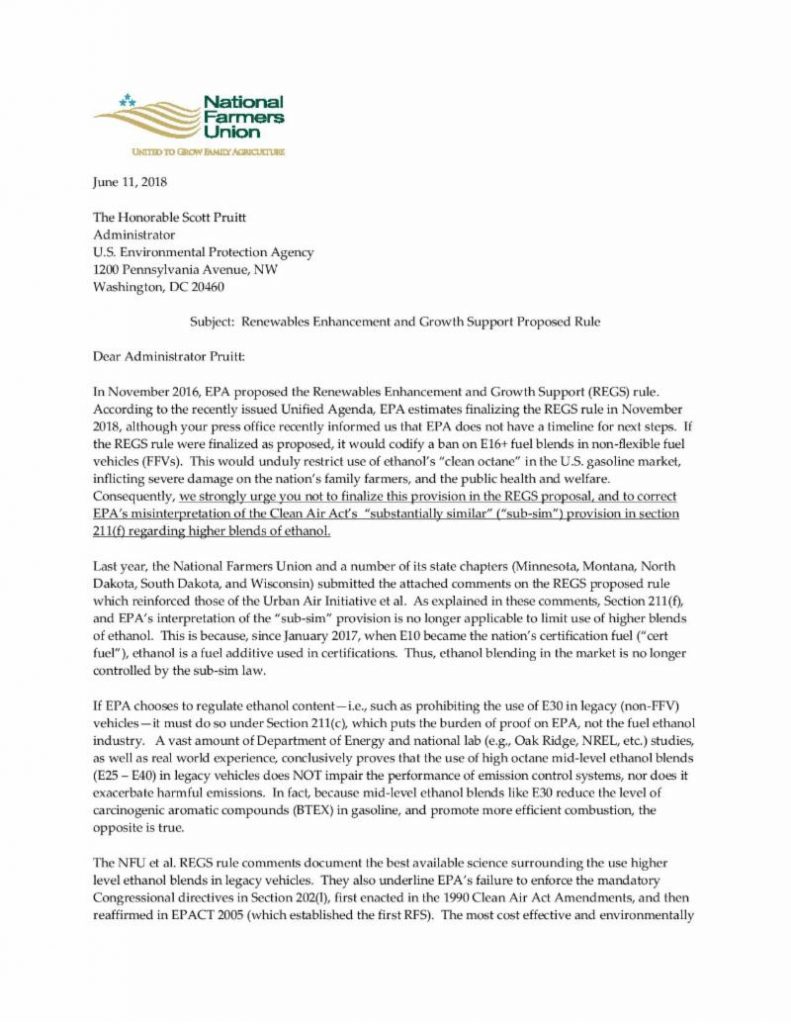S.D. Farmers Union President Sends Letter to Pruitt Calling On EPA to Stop Efforts to Block Ethanol Blends
Doug Sombke, President of the South Dakota Farmers Union was joined by National Farmers Union President Roger Johnson today (June 11, 2018) in calling for the Environmental Protection Agency (EPA) to abandon plans to finalize an Obama era rule that would cap ethanol blends at 15%.
In a letter to U.S. Environmental Protection Agency (EPA) Administrator Scott Pruitt, Sombke and Johnson criticized the Renewable Enhancement and Growth Support (REGS) rule that would deny higher ethanol blends in conventional vehicles. Originally proposed in 2016, the National Farmers Union and a number of its state chapters (Minnesota, Montana, North Dakota, South Dakota, and Wisconsin) submitted comments in opposition to the REGS Rule, arguing that EPA has misinterpreted the substantially similar provision of the Clean Air Act and that ethanol is now the nation’s base certification fuel and is not limited as to volumes.
EPA has not put a specific timetable on the rule but has indicated it proposes to submit it for final approval to the Office of Management and Budget (OMB) which reviews all rules before being finalized.
The letter states that, “If EPA chooses to regulate ethanol content-i.e., such as prohibiting the use of E30 in legacy (non-FFV) vehicles-it must do so under Section 211(c), which puts the burden of proof on EPA, not the fuel ethanol industry. A vast amount of Department of Energy and national lab studies, as well as real world experience, conclusively proves that the use of high octane mid-level ethanol blends (E25 – E40) in legacy vehicles does NOT impair the performance of emission control systems, nor does it exacerbate harmful emissions. In fact, because mid-level ethanol blends like E30 reduce the level of carcinogenic aromatic compounds (BTEX) in gasoline, and promote more efficient combustion, the opposite is true.”
“This has a direct impact on South Dakota Agriculture and could be worth $1.5 billion to our economy,” said Sombke. “Here we are demonstrating that E30 blends are high performance, high value fuels and EPA is considering denying this option.”
Sombke noted that EPA has not only failed to help increase the domestic ethanol market but is taking it backwards with the recent refinery waivers and ignoring the vapor pressure waiver requests for higher blends. FlexFuel Vehicle credits have all but been eliminated by EPA and there is simply no pathway for expanding the ethanol market, he added.
EPA is also proposing new fuel economy rules that Administrator Pruitt has acknowledged would be well served by higher octane fuels, octane that ethanol blends like the E30 being used throughout South Dakota can easily and economically provide.
“For an administration that professes to support removal of rules and regulations that impede domestic energy production – not to mention supporting American agriculture – this is the opposite of that promise. Our message to EPA is to open the market and remove these barriers to higher blends and help us create new markets for our corn.


